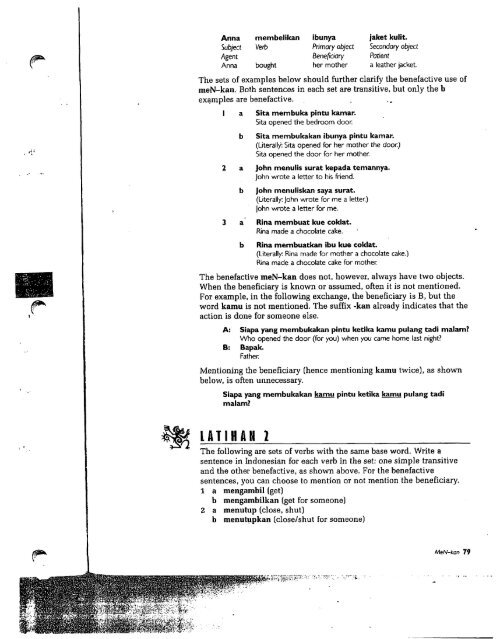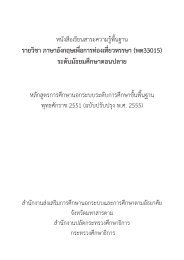bahasa indonesia
djenar-2003-a-students-guide-to-indonesian-grammar-oxford
djenar-2003-a-students-guide-to-indonesian-grammar-oxford
- No tags were found...
Create successful ePaper yourself
Turn your PDF publications into a flip-book with our unique Google optimized e-Paper software.
Anna membelikan ibunya jaket kulit.<br />
Subject Verb Primary object Secondary object<br />
Agent Beneficiary Patient<br />
Anna bought her mother a leather jacket.<br />
The sets of examples below should further clarify the benefactive use of<br />
meN-kan.. Both sentences in each set are transitive, but only the b<br />
examples are benefactive. .<br />
- _<br />
I a Sita membuka pintu kamar.<br />
Sita opened the bedroom door;<br />
b<br />
Sita membukakan ibunya pintu kamar.<br />
(Literally: Sita opened for her mother the dooc)<br />
Sita opened the door for her mother;<br />
2 a John menulis surat kepada temannya.<br />
John wrote a letter to his friend.<br />
b<br />
John menuliskan saya surat.<br />
(Lierally:]ohn wrote for me a letter.)<br />
John wrote a letter for me.<br />
3 a Rina membuat kue coklat.<br />
Rna made a chocolate cake. -<br />
b<br />
Rina membuatkan ibu kue coklat.<br />
(Literally: Rina made for mother a chocolate cake.)<br />
Rina made a chocolate cake for mother.<br />
The benefactive meN-kan does not, however, always have two objects.<br />
When the beneficiary is known or assumed, often it is not mentioned.<br />
For example, in the following exchange, the beneficiary is B, but the<br />
word kamu is not mentioned. The suffix -kan already indicates that the<br />
action is done for someone else.<br />
A: Siapa yang membukakan pintu ketika kamu pulang tadi malam?<br />
Who opened the door (for you) when you came home last night?<br />
B: Bapak.<br />
Father:<br />
Mentioning the beneficiary (hence mentioning kamu twice), as shown<br />
below, is often unnecessary.<br />
Siapa yang membukakan k_amu pintu ketika kamu pulang tadi<br />
malam?<br />
-4 The following are sets of verbs with the same base word. Write a<br />
sentence in ~Gdonesian for each verb in the set: one simple transitive<br />
and the other benefactive, as shown above. For the benefactive<br />
sentences, you can choose to mention or not mention the beneficiary.<br />
1 a mengambil (get)<br />
b mengambilkan (get for someone)<br />
2 a menutup (close, shut)<br />
b menutupkan (close/shut for someone)



